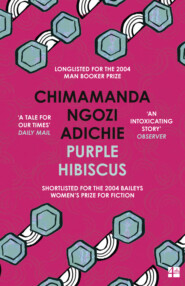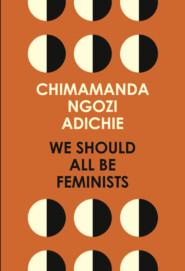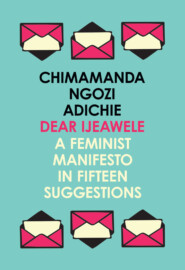По всем вопросам обращайтесь на: info@litportal.ru
(©) 2003-2024.
✖
Half of a Yellow Sun
Настройки чтения
Размер шрифта
Высота строк
Поля
‘Oh, good. So that means you will be spending time in Nsukka?’
Kainene ignored the question. ‘Richard doesn’t know anybody in Nsukka, so maybe you could introduce him to your revolutionary lover.’
Olanna smiled. Revolutionary lover. The things Kainene could say with a straight face! ‘I’ll introduce them,’ she said. She had never liked any of Kainene’s boyfriends and never liked that Kainene dated so many white men in England. Their thinly veiled condescension, their false validations irritated her. Yet she had not reacted in the same way to Richard Churchill when Kainene brought him to dinner. Perhaps it was because he did not have that familiar superiority of English people who thought they understood Africans better than Africans understood themselves and, instead, had an endearing uncertainty about him – almost a shyness. Or perhaps because her parents had ignored him, unimpressed because he didn’t know anyone who was worth knowing.
‘I think Richard will like Odenigbo’s house,’ Olanna said. ‘It’s like a political club in the evenings. He only invited Africans at first because the university is so full of foreigners, and he wanted Africans to have a chance to socialize with one another. At first it was BYOB, but now he asks them all to contribute some money, and every week he buys drinks and they meet in his house –’ Olanna stopped. Kainene was looking at her woodenly, as if she had broken their unspoken rule and tried to start idle chatter.
Kainene turned towards the door. ‘When do you leave for Kano?’
‘Tomorrow.’ Olanna wanted Kainene to stay, to sit on the bed and hold a pillow on her lap and gossip and laugh into the night.
‘Go well, jee ofuma. Greet Aunty and Uncle and Arize.’
‘I will,’ Olanna said, although Kainene had already left and shut the door. She listened for Kainene’s footsteps on the carpeted hallway. It was now that they were back from England, living in the same house again, that Olanna realized just how distant they had become. Kainene had always been the withdrawn child, the sullen and often acerbic teenager, the one who, because she did not try to please their parents, left Olanna with that duty. But they had been close, despite that. They used to be friends. She wondered when it all changed. Before they went to England, for sure, since they didn’t even have the same friends in London. Perhaps it was during their secondary- school years at Heathgrove. Perhaps even before. Nothing had happened – no momentous quarrel, no significant incident – rather, they had simply drifted apart, but it was Kainene who now anchored herself firmly in a distant place so that they could not drift back together.
Olanna chose not to fly up to Kano. She liked to sit by the train window and watch the thick woods sliding past, the grassy plains unfurling, the cattle swinging their tails as they were herded by barechested nomads. When she got to Kano, it struck her once again how different it was from Lagos, from Nsukka, from her hometown Umunnachi, how different the North as a whole was from the South. Here, the sand was fine, grey, and sun-seared, nothing like the clumpy, red earth back home; the trees were tame, unlike the bursting greenness that sprang up and cast shadows on the road to Umunnachi. Here, miles of flatland went on and on, tempting the eyes to stretch just a little farther, until they seemed to meet with the silver-and-white sky.
She took a taxi from the train station and asked the driver to stop first at the market, so that she could greet Uncle Mbaezi.
On the narrow market paths, she manoeuvred between small boys carrying large loads on their heads, women haggling, traders shouting. A record shop was playing loud High Life music, and she slowed a little to hum along to Bobby Benson’s ‘Taxi Driver’ before hurrying on to her uncle’s stall. His shelves were lined with pails and other housewares.
‘Omalicha!’ he said, when he saw her. It was what he called her mother, too – Beautiful. ‘You have been on my mind. I knew you would come to see us soon.’
‘Uncle, good afternoon.’
They hugged. Olanna rested her head on his shoulder; he smelt of sweat, of the open-air market, of wares arranged on dusty wood shelves.
It was hard to imagine Uncle Mbaezi and her mother growing up together, brother and sister. Not only because her uncle’s light- complexioned face had none of her mother’s beauty, but also because there was an earthiness about him. Sometimes Olanna wondered if she would admire him as she did if he were not so different from her mother.
Whenever she visited, Uncle Mbaezi would sit with her in the yard after supper and tell her the latest family news – a cousin’s unmarried daughter was pregnant, and he wanted her to come and stay with them to avoid the malice of the village; a nephew had died here in Kano and he was looking into the cheapest way to take the body back home. Or he would tell her about politics: What the Igbo Union was organizing, protesting, discussing. They held meetings in his yard. She had sat in a few times, and she still remembered the meeting where irritated men and women talked about the northern schools not admitting Igbo children. Uncle Mbaezi had stood up and stamped his foot. ‘Ndi be anyi! My people! We will build our own school! We will raise money and build our own school!’ After he spoke, Olanna had joined in clapping her approval, in chanting, ‘Well spoken! That is how it shall be!’ But she had worried that it would be difficult to build a school. Perhaps it was more practical to try and persuade the Northerners to admit Igbo children.
Yet, now, only a few years later, her taxi was on Airport Road, driving past the Igbo Union Grammar School. It was break time and the schoolyard was full of children. Boys were playing football in different teams on the same field, so that multiple balls flew in the air; Olanna wondered how they could tell which ball was which. Clusters of girls were closer to the road, playing oga and swell, clapping rhythmically as they hopped first on one leg and then the other. Before the taxi parked outside the communal compound in Sabon Gari, Olanna saw Aunty Ifeka sitting by her kiosk on the roadside. Aunty Ifeka wiped her hands on her faded wrapper and hugged Olanna, pulled back to look at her, and hugged her again. ‘Our Olanna!’
‘My aunty! Kedu? ’
‘I am even better now that I see you.’
‘Arize is not back from her sewing class?’
‘She will be back anytime now.’
‘How is she doing? O na-agakwa? Is her sewing going well?’
‘The house is full of patterns that she has cut.’
‘What of Odinchezo and Ekene?’
‘They are there. They visited last week and asked after you.’
‘How is Maiduguri treating them? Is their trading picking up?’
‘They have not said they are dying of hunger,’ Aunty Ifeka said, with a slight shrug. Olanna examined the plain face and wished, for a brief guilty moment, that Aunty Ifeka were her mother. Aunty Ifeka was as good as her mother, anyway, since it was Aunty Ifeka’s breasts that she and Kainene had sucked when their mother’s dried up soon after they were born. Kainene used to say their mother’s breasts did not dry up at all, that their mother had given them to a nursing aunt only to save her own breasts from drooping.
‘Come, ada anyi,’ Aunty Ifeka said. ‘Let’s go inside.’ She pulled down the wooden shutters of the kiosk, covering the neatly arranged cases of matches, chewing gum, sweets, cigarettes, and detergent, and then picked up Olanna’s bag and led the way into the yard. The narrow bungalow was unpainted. The clothes hung out to dry were still, stiff, as if desiccated by the hot afternoon sun. Old car tyres, the ones the children played with, were piled under the kuka tree. Olanna knew the tranquil flatness of the yard would change soon, when the children came back from school. The families would leave doors open and the veranda and kitchen would fill with chatter. Uncle Mbaezi’s family lived in two rooms. In the first, where worn sofas were pushed aside at night to make room for mats, Olanna unpacked the things she had brought – bread, shoes, bottles of cream – while Aunty Ifeka stood back watching, her hands behind her back. ‘May another person do for you. May another person do for you,’ Aunty Ifeka said.
Arize came home moments later and Olanna braced herself to stand firmly, so Arize’s excited hug would not knock her down.
‘Sister! You should have warned us that you were coming! At least we would have swept the yard better! Ah! Sister! Aru amaka gi! You look well! There are stories to tell, oh!’
Arize was laughing. Her plump body, her rounded arms, shook as she laughed. Olanna held her close. She felt a sense that things were in order, the way they were meant to be, and that even if they tumbled down once in a while, in the end they would come back together again. This was why she came to Kano: this lucid peace. When Aunty Ifeka’s eyes began to dart around the yard, she knew it was in search of a suitable chicken. Aunty Ifeka always killed one when she visited, even if it was the last she owned, sauntering around the yard, its feathers marked with a splash or two of red paint to distinguish it from the neighbours’ chickens, which had bits of cloth tied to their wings or paint of a different colour. Olanna no longer protested about the chicken, just as she no longer protested when Uncle Mbaezi and Aunty Ifeka slept on mats, next to the many relatives who always seemed to be staying with them, so that she could have their bed.
Aunty Ifeka walked casually towards a brown hen, grasped it quickly, and handed it to Arize to kill in the backyard. They sat outside the kitchen while Arize plucked it and Aunty Ifeka blew the chaff from the rice. A neighbour was boiling corn, and once in a while, when the water frothed over, the stove fire hissed. Children were playing in the yard now, raising white dust, shouting. A fight broke out under the kuka tree, and Olanna heard a child scream at another in Igbo, ‘Your mother’s pussy!’
The sun had turned red in the sky before it began its descent, when Uncle Mbaezi came home. He called out to Olanna to come and greet his friend Abdulmalik. Olanna had met the Hausa man once before; he sold leather slippers close to Uncle Mbaezi’s stall in the market, and she had bought a few pairs that she took back to England but never wore because it was then the middle of winter.
‘Our Olanna has just finished her master’s degree. Master’s degree at London University! It is not easy!’ Uncle Mbaezi said proudly.
‘Well done,’ Abdulmalik said. He opened his bag and brought out a pair of slippers and held them out to her, his narrow face creased in a smile, his teeth stained with kola nut and tobacco and whatever else Olanna did not know, stains of varying shades of yellow and brown. He looked as if it were he who was receiving a gift; he had that expression of people who marvelled at education with the calm certainty that it would never be theirs.
She took the slippers with both hands. ‘Thank you, Abdulmalik. Thank you.’
Abdulmalik pointed at the ripe gourdlike pods on the kuka tree and said, ‘You come my house. My wife cook very sweet kuka soup.’
‘Oh, I will come, next time,’ Olanna said.
He muttered more congratulations before he sat with Uncle Mbaezi on the veranda, with a bucket of sugar cane in front of them. They gnawed off the hard, green peels and chewed the juicy, white pulp, speaking Hausa and laughing. They spit the chewed cane out on the dust. Olanna sat with them for a while, but their Hausa was too swift, too difficult to follow. She wished she were fluent in Hausa and Yoruba, like her uncle and aunt and cousin were, something she would gladly exchange her French and Latin for.
In the kitchen, Arize was cutting open the chicken and Aunty Ifeka was washing the rice. She showed them the slippers from Abdulmalik and put them on; the pleated red straps made her feet look slender, more feminine.
‘Very nice,’ Aunty Ifeka said. ‘I shall thank him.’
Olanna sat on a stool and carefully avoided looking at the cockroach eggs, smooth black capsules, lodged in all corners of the table. A neighbour was building a wood fire in one corner and despite the slanting openings in the roof, the smoke choked the kitchen.
‘I makwa, all her family eats every day is stockfish,’ Arize said, gesturing towards the neighbour with pursed lips. ‘I don’t know if her poor children even know what meat tastes like.’ Arize threw her head back and laughed.
Olanna glanced at the woman. She was an Ijaw and could not understand Arize’s Igbo. ‘Maybe they like stockfish,’ she said.
‘O di egwu! Like it indeed! Do you know how cheap the thing is?’ Arize was still laughing as she turned to the woman. ‘Ibiba, I am telling my big sister that your soup always smells so delicious.’
The woman stopped blowing at the firewood and smiled, a knowing smile, and Olanna wondered if perhaps the woman understood Igbo but chose to humour Arize’s fun poking. There was something about Arize’s effervescent mischief that made people forgiving.
‘So you are moving to Nsukka to marry Odenigbo, Sister?’ Arize asked.
‘I don’t know about marriage yet. I just want to be closer to him, and I want to teach.’
Arize’s round eyes were admiring and bewildered. ‘It is only women that know too much Book like you who can say that, Sister. If people like me who don’t know Book wait too long, we will expire.’ Arize paused as she removed a translucently pale egg from inside the chicken. ‘I want a husband today and tomorrow, oh! My mates have all left me and gone to husbands’ houses.’
‘You are young,’ Olanna said. ‘You should focus on your sewing for now.’









